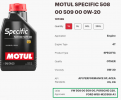Hi - I'm thinking of doing some extra oil changes for my 2022 Ibiza FR in between the (very long) dealer oil changes service intervals, especially as I do quite a lot of relatively short journeys. So I started looking at which oil to use, obviously for my model Ibiza this needs to be a 0w-20 Longlife oil that meets the VW 508/509 spec and has the green/blue dye in it to avoid warranty issues.
Anyway I came across this detailed technical analysis of such oils: https://ato24.de/en/blog/comparison-0w-20-engine-oils/
One of the things I was thinking would be good to look for is as an oil with a low NOACK score, as that should evaporate off a bit less oil in use, and hopefully lead to less carbon depositing on the valves, which can be a big problem for direct injection engines like the VAG 1.0 TSI. But there are other things to consider about an oil too, such as it's viscosity at different operating temperatures.
Looking at the results, the VW-branded oil (not sure if that Castrol, Mobile or something else these days?) looks okay, as one would expect, but not outstanding. The two of the oils that stand out, at least as far as the NOACK scores look to be:
Motul Specific 508 00 509 00 0W-20
and
Shell Helix Ultra Professional AV-L 0W-20
With I think the Motul oil looking the most consistently good of the two across all the other tests.
So am thinking of using the Motul Specific oil for my oil changes. The issue, though, is I guess is that you can't give the dealer a 5L can of Motul oil and tell them to use that for when they do an oil change service - or can you?
Anyway I came across this detailed technical analysis of such oils: https://ato24.de/en/blog/comparison-0w-20-engine-oils/
One of the things I was thinking would be good to look for is as an oil with a low NOACK score, as that should evaporate off a bit less oil in use, and hopefully lead to less carbon depositing on the valves, which can be a big problem for direct injection engines like the VAG 1.0 TSI. But there are other things to consider about an oil too, such as it's viscosity at different operating temperatures.
Looking at the results, the VW-branded oil (not sure if that Castrol, Mobile or something else these days?) looks okay, as one would expect, but not outstanding. The two of the oils that stand out, at least as far as the NOACK scores look to be:
Motul Specific 508 00 509 00 0W-20
and
Shell Helix Ultra Professional AV-L 0W-20
With I think the Motul oil looking the most consistently good of the two across all the other tests.
So am thinking of using the Motul Specific oil for my oil changes. The issue, though, is I guess is that you can't give the dealer a 5L can of Motul oil and tell them to use that for when they do an oil change service - or can you?



